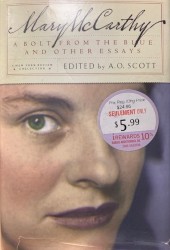Synopsis
Mary McCarthy was one of the leading literary figures of her time. In addition to the novels and memoirs for which she is best remembered, she was also a tireless literary and social critic. Starting out as a theater reviewer for Partisan Review in 1937, she quickly distinguished herself for her witty and fearless commentary on topics ranging from McCarthyism to the French New Novel to women’s fashion magazines. McCarthy was an eager controversialist, unsparing in her dissection of anything she found phony or hypocritical. Her reviews are sharp, sometimes malicious, and often very funny, but her criticism is also informed by deep erudition and enlivened by an inexhaustible capacity for enthusiasm. Her political writings, critical in equal measure of the Cold War consensus and of its critics, are less concerned with finding correct positions than with exploring the often absurd circumstances in which agonizing moral decisions are made.
While the soundness of McCarthy’s judgments can sometimes be doubted, her curiosity and intelligence cannot. The intellectual brio and acute judgment that characterizes her best fiction is vividly displayed in this selection of essays, which span McCarthy’s career from the late 1930s to the late 1970s. It includes her writings on topics such as fashion magazines, Eugene O’Neill, A Streetcar Named Desire, Look Back in Anger, Pale Fire, J.D. Salinger, Madame Bovary, Italo Calvino, and Watergate. The volume constitutes not only a valuable record of the ideological and cultural controversies that dominated American intellectual life from the Moscow trials to the Watergate hearings, but will also introduce a new generation of readers to a uniquely forthright and vibrant critical voice.






